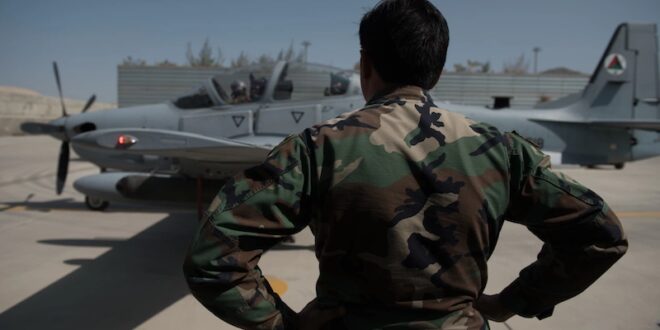Sitting on the carpet in a small, third-floor apartment of a crowded building on the edge of the Pakistani capital, Islamabad, six Afghan men sip traditional green tea as they scroll through messages and videos on their phones. All of them are anxiously awaiting the same thing – an email that will tell them where they stand in their journey to resettlement in the United States.
The men were pilots and engineers in Afghanistan’s military when the Taliban seized control of the country in August 2021. Fearing retaliation from those they had fought for years, these pilots, like hundreds of their colleagues, fled the country.
Almost 18 months since their arrival in Pakistan, the men voice frustration as their applications slowly make their way through the complicated U.S. refugee resettlement process.
“Some of my friends got to Europe with help from human traffickers. If I had taken the money that I have spent here, from my savings, for the last 18 months, if I had spent that money on [trafficking] my life would have been better,” said a pilot who asked that we identify him as Hafeezullah, instead of with his real name as he feared for his safety.
“I would have gotten refuge in a European country by now,” the 27-year-old said.
In the first few months of the Taliban’s return to power, the U.S. welcomed nearly 90,000 Afghans who feared for their well-being under the new regime. In early 2022, Washington moved to a second phase in which the U.S. Refugee Admissions Program provides the most straightforward path to Afghans seeking refugee resettlement in the United States.
To qualify, refugees must, on their own, first reach a third country where they can contact the State Department to begin the resettlement process. The pilots chose Pakistan as it provides an easy land route out of Afghanistan, and has diplomatic relations with the U.S., unlike Iran.
The pilots with whom VOA met were recommended for refugee resettlement by some of the American soldiers who trained them during the U.S.-led Afghan war.
After waiting for months, the pilots received their Afghan Referral Record, or ARR, numbers from the Resettlement Support Center in Pakistan. But there is still a long road ahead.
“Case processing can be lengthy (potentially 12-18 months),” says the State Department’s website.
The pilots will go through a pre-screening process at the Resettlement Support Center. This will be followed by an interview conducted by a U.S. immigration officer, multiple security checks, and a medical examination to determine their eligibility for resettlement in the United States.
The time-consuming process is also suffering delays because it is understaffed, partly due to a 2017 Trump administration decision to drastically cut down refugee admissions.
“So, it had to really be recreated from scratch,” said Bill Frelick, the refugee and migrant rights director at Human Rights Watch. “In addition to that, the entire infrastructure which is largely run by non-governmental locations was decimated,” he said.
Despite the Biden administration increasing staffing, nearly a quarter of the positions are still unfilled in the international and refugee affairs division of the U.S. Citizenship and Immigration Services. That’s according to a recent report by the office of the Special Inspector General for Afghanistan Reconstruction, or SIGAR, an autonomous U.S. government auditor.
As cases drag on, patience and money dwindle
During case processing, prospective refugees must be able to support themselves in the third country. For Afghan pilots living in Pakistan on expired visas, finding work is hard. Most of them are jobless and rely on their families back home to borrow money to send them.
An Afghan pilot, who wished to be called Ahmed to protect his identity, told VOA he had run out of the money he gathered by selling his household goods before leaving Afghanistan.
“Now I have started selling my wife’s jewelry”, said the 30-year-old Black Hawk pilot.
Another pilot who requested to be called Tawheed for security reasons said the stress of not knowing what the future held for his two little girls was causing him health problems.
“We [I] have high blood pressure, we [I] have a sugar [diabetes], we [I] have a mentally [mental health] problem, we [I] have depression,” the 32-year-old said.
Despite the uncertainty, the pilots say they cannot go back to Afghanistan as they worry the Taliban will accuse them of spreading “propaganda” against them in Pakistan. Others like Ahmed say the Taliban are looking for them.
“They came and searched my house many times. They took many of my books, because I had many English books. They took some of my [training] awards,” said Ahmed as he pulled up a video on his phone shot by a relative showing armed Taliban guards visiting his home.
Roughly 40 Afghan pilots are in Pakistan, waiting to be moved to the U.S. Seeing little progress in their refugee resettlement cases, the pilots VOA met said they felt abandoned.
“We are unhappy with our American friends who advised us to come here,” said Hafeezullah.
But the Americans who referred the pilots cannot do much. VOA reached out to several but did not get a response.
In written reply to VOA, the State Department said it was prioritizing Afghan allies and actively trying to expand processing capacity in Pakistan, which it admitted remains limited.
“We have been actively pursuing all potentially viable options to enable USRAP processing in Pakistan and will continue our efforts to process cases promptly,” the department said without elaborating on the options.
Addressing the complex nature of the refugee vetting process, the department said it will continue to use every tool to prevent those who might pose threats to American communities from entering the United States.
But the Americans who referred the pilots cannot do much. VOA reached out to a few but did not get a response.
VOA reached out to the State Department as well but did not get a response as of publication.
Away from loved ones, with little in their pockets, and not much information on when the next step in their resettlement will come, the pilots are losing patience. Hafeezullah, who said he had joined the air force to serve his country, says he now feels purposeless.
“When I wake up, I have a mind without goals. I see a devastated life with no future,” he said.
Others are trying not to give up hope of making it to the U.S one day.
“We just want from Allah, from God, there should be something good, some hope for the future, for my family, for my daughters,” Tawheed said. “If I see the situation, there is no hope, but Allah, I know will change everything.”
 Eurasia Press & News
Eurasia Press & News



